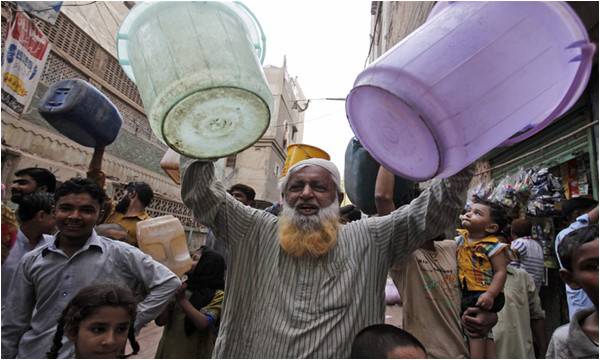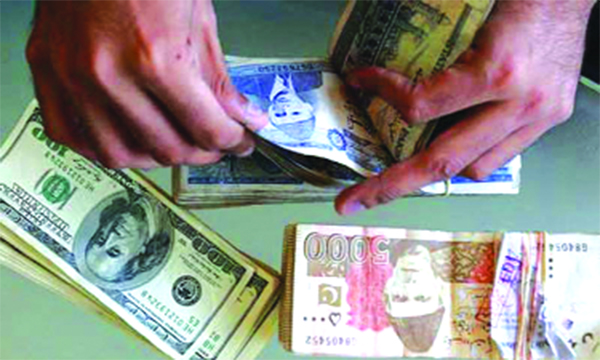
It’s amazing how a shadow has taken over Pakistan’s economic landscape within such a short span of time. But is the darkness sudden? Or was the storm on its way and we just chose to look the other way? A bit of both, perhaps.
All reports that once praised Pakistan’s economic turnaround since it averted a balance of payments crisis in 2013 have vanished. The government itself has decided to stay quieter and humbler. Critics have become louder and gained confidence.
Pessimism over Pakistan’s ability to self-sustain has morphed into realism with many saying that another bailout from the International Monetary Fund is in the offing.
A one-day rupee depreciation, widening current account and trade deficits, a bearish stock market, increasing doubts over the viability of the China-Pakistan Economic Corridor (CPEC), and skyrocketing circular debt only add to the sense of crisis. But these issues only scratch the surface.
Issues such as structural reforms, a frail power sector, and loss-making state-owned entities are deeper, older wounds.
To be fair, Pakistan has never been an economic powerhouse. It has always remained a third-world country. Since the 1960s, however, the situation has taken a turn for the worse.
From wars to nationalisation, the country’s priorities have changed. Policymakers have tried to make everyone happy. Someone needs to remind them that it doesn’t work this way.
While Pakistan has had its share of impressive growth, the path has been undone with detours. More often than not, the economy has taken the exits and made a comeback after a long stretch of aimless driving.
Although different in nature, the current situation is a stark reminder of what goes wrong with Pakistan. Simply put, we just can’t see things through. Oil prices fell over 60% and, like every other oil-importing country, we stood to benefit.
We took advantage, while we were under the three-year, watchful programme of the IMF. Activity was monitored and any wrong move was met with a red flag.
What has happened since is anybody’s guess.
Measures to increase tax collection have stopped. Instead, populist moves to appease the masses and win a vote-bank have increased.
The country’s gas production has remained stagnant, but the government has decided to allow new connections as it seeks to penetrate into the rural areas for support.
Circular debt, cleared off in 2013, is now close to Rs800 billion – almost twice as much as it was back then. When you think about how low oil prices are, the addition to debt is staggering.
The rupee is Finance Minister Ishaq Dar’s favourite currency. He promised bringing it back down, and he did. But for those four years, exporters suffered and complained. Their refunds remained stuck with the Federal Board of Revenue, which was more than willing and more than happy to use them to inflate revenues. Give that amount back, and we will see how much tax collection has actually increased.
CPEC, sold as a game-changer, has only resulted in a widening trade and current account deficit so far. The government says heavy machinery is being imported, a capital expenditure that would add to the country’s economic growth. Fair enough.

Two questions, though. How exactly are we going to continue paying for imports when foreign exchange reserves are falling non-stop? Second, data reveals imports are actually made up of a lot of non-essential items as well since a strong rupee – even if it is genuinely strong – has allowed for imports to become cheaper.
One can see what Pakistan’s strategy is. Use debt, loans, and grants to increase foreign exchange reserves. Sell profitable assets to increase non-tax revenue and book a few amounts here and there to show a reduced budget deficit. Circular debt, which was cleared off, has not been booked, though. Why would it when all it does is increase deficit. It has been parked, away from the budget books, in a holding company.
These are not made-up stories, but the reality. The government has had a golden opportunity to turn things around. It hasn’t.
It could have revitalised distribution companies (DISCOs), but it didn’t. Entities like Railways, Pakistan Post and Pakistan Steel Mills continue to the elephants in the room.
In a background discussion, officials of a global lender stated that it was disappointing that Pakistan could not continue the reforms process, and deviated. We didn’t deviate. We went off track, turned around and reversed full speed to the point of standing where we were a few years ago.
While one does not doubt the government’s intention, it needs to admit that when it came to taking touchy decisions, it caved.
The ongoing transporters’ strike, a regular feature of lobby groups to pressure the government, is a classic example. Whenever Pakistan should take the long road to heaven, it chooses to take the shortcut to hell.
The writer is a business analyst in Karachi
All reports that once praised Pakistan’s economic turnaround since it averted a balance of payments crisis in 2013 have vanished. The government itself has decided to stay quieter and humbler. Critics have become louder and gained confidence.
Pessimism over Pakistan’s ability to self-sustain has morphed into realism with many saying that another bailout from the International Monetary Fund is in the offing.
A one-day rupee depreciation, widening current account and trade deficits, a bearish stock market, increasing doubts over the viability of the China-Pakistan Economic Corridor (CPEC), and skyrocketing circular debt only add to the sense of crisis. But these issues only scratch the surface.
Measures to increase tax collection have stopped. Instead, populist moves to appease the masses and win a vote-bank have increased
Issues such as structural reforms, a frail power sector, and loss-making state-owned entities are deeper, older wounds.
To be fair, Pakistan has never been an economic powerhouse. It has always remained a third-world country. Since the 1960s, however, the situation has taken a turn for the worse.
From wars to nationalisation, the country’s priorities have changed. Policymakers have tried to make everyone happy. Someone needs to remind them that it doesn’t work this way.
While Pakistan has had its share of impressive growth, the path has been undone with detours. More often than not, the economy has taken the exits and made a comeback after a long stretch of aimless driving.
Although different in nature, the current situation is a stark reminder of what goes wrong with Pakistan. Simply put, we just can’t see things through. Oil prices fell over 60% and, like every other oil-importing country, we stood to benefit.
We took advantage, while we were under the three-year, watchful programme of the IMF. Activity was monitored and any wrong move was met with a red flag.
What has happened since is anybody’s guess.
Measures to increase tax collection have stopped. Instead, populist moves to appease the masses and win a vote-bank have increased.
The country’s gas production has remained stagnant, but the government has decided to allow new connections as it seeks to penetrate into the rural areas for support.
To be fair, Pakistan has never been an economic powerhouse. It has always remained a third-world country. Since the 1960s, however, the situation has taken a turn for the worse
Circular debt, cleared off in 2013, is now close to Rs800 billion – almost twice as much as it was back then. When you think about how low oil prices are, the addition to debt is staggering.
The rupee is Finance Minister Ishaq Dar’s favourite currency. He promised bringing it back down, and he did. But for those four years, exporters suffered and complained. Their refunds remained stuck with the Federal Board of Revenue, which was more than willing and more than happy to use them to inflate revenues. Give that amount back, and we will see how much tax collection has actually increased.
CPEC, sold as a game-changer, has only resulted in a widening trade and current account deficit so far. The government says heavy machinery is being imported, a capital expenditure that would add to the country’s economic growth. Fair enough.

Two questions, though. How exactly are we going to continue paying for imports when foreign exchange reserves are falling non-stop? Second, data reveals imports are actually made up of a lot of non-essential items as well since a strong rupee – even if it is genuinely strong – has allowed for imports to become cheaper.
One can see what Pakistan’s strategy is. Use debt, loans, and grants to increase foreign exchange reserves. Sell profitable assets to increase non-tax revenue and book a few amounts here and there to show a reduced budget deficit. Circular debt, which was cleared off, has not been booked, though. Why would it when all it does is increase deficit. It has been parked, away from the budget books, in a holding company.
These are not made-up stories, but the reality. The government has had a golden opportunity to turn things around. It hasn’t.
It could have revitalised distribution companies (DISCOs), but it didn’t. Entities like Railways, Pakistan Post and Pakistan Steel Mills continue to the elephants in the room.
In a background discussion, officials of a global lender stated that it was disappointing that Pakistan could not continue the reforms process, and deviated. We didn’t deviate. We went off track, turned around and reversed full speed to the point of standing where we were a few years ago.
While one does not doubt the government’s intention, it needs to admit that when it came to taking touchy decisions, it caved.
The ongoing transporters’ strike, a regular feature of lobby groups to pressure the government, is a classic example. Whenever Pakistan should take the long road to heaven, it chooses to take the shortcut to hell.
The writer is a business analyst in Karachi

